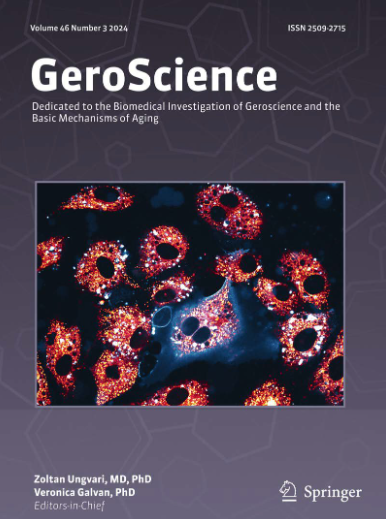饮食性肥胖雄性小鼠心脏功能和身体机能的年龄依赖性损伤。
IF 5.3
2区 医学
Q1 GERIATRICS & GERONTOLOGY
引用次数: 0
摘要
肥胖背景下的衰老加剧了与心血管疾病相关的发病率和死亡率的风险。然而,长期肥胖引起的心脏适应不良反应和生物年龄的具体影响仍然有些难以捉摸。本研究探讨了饮食性肥胖(DIO)和衰老对小鼠身体机能和心血管功能的影响。22周龄和76周龄雄性C57BL/6J小鼠随机分为8周的鼠粮和高脂饮食。每周评估体重。在饮食治疗开始和结束时测量体成分。在干预结束时评估肌肉和心脏功能。老年小鼠DIO表现出更快、更大的体重增加和脂肪积累,跑步距离缩短,有氧能力降低。老年HFD小鼠也表现出心脏脂质积累增加和心肌细胞肥大,骨骼肌没有明显的形态学变化。蛋白质组学分析显示,与代谢功能相关的心脏蛋白在年轻小鼠中表达差异,而在老年小鼠中没有观察到这种差异。随后,患有DIO的老年小鼠出现明显的心力衰竭,射血分数降低,而年轻小鼠的心脏功能未受DIO影响。综上所述,年轻小鼠DIO可防止饮食引起的心功能障碍,而老年小鼠DIO可导致心力衰竭和身体机能受损。在年轻小鼠中观察到的保护作用似乎可以通过蛋白质组水平的心脏重塑来解释,以维持心脏功能。本文章由计算机程序翻译,如有差异,请以英文原文为准。
Age-dependent impairment of cardiac function and physical performance in male mice with diet-induced obesity.
Aging in the context of obesity exacerbates the risk of morbidity and mortality related to cardiovascular disease. However, the maladaptive responses in the heart that arise from prolonged obesity and the specific influence of biological age remain somewhat elusive. This study investigated the effects of diet-induced obesity (DIO) and aging on physical performance and cardiovascular function in mice. 22- and 76-week-old male C57BL/6J mice were randomized to 8 weeks of chow or high-fat diet. Body weight was assessed weekly. Body composition was measured at the beginning and the end of the diet treatment. Muscular and cardiac function were evaluated at the end intervention. Aged mice with DIO exhibited faster and greater body weight gain and fat mass accumulation, reduced running distance, and lower aerobic capacity. Aged HFD mice also exhibited increased cardiac lipid accumulation and cardiomyocyte hypertrophy, with no major morphological changes observed in skeletal muscle. Proteomic analysis revealed differential expression of heart proteins associated with metabolic function in young mice, which was not observed in aged mice with DIO. Subsequently, aged mice with DIO developed overt heart failure with reduced ejection fraction, while cardiac function was unaffected by DIO in young mice. In conclusion, young mice with DIO were protected against diet-induced cardiac dysfunction, whereas DIO in aged mice led to heart failure and impaired physical performance. The protective effects observed in younger mice appear to be explained by proteomic-level remodeling of the heart oriented to sustain cardiac function.
求助全文
通过发布文献求助,成功后即可免费获取论文全文。
去求助
来源期刊

GeroScience
Medicine-Complementary and Alternative Medicine
CiteScore
10.50
自引率
5.40%
发文量
182
期刊介绍:
GeroScience is a bi-monthly, international, peer-reviewed journal that publishes articles related to research in the biology of aging and research on biomedical applications that impact aging. The scope of articles to be considered include evolutionary biology, biophysics, genetics, genomics, proteomics, molecular biology, cell biology, biochemistry, endocrinology, immunology, physiology, pharmacology, neuroscience, and psychology.
 求助内容:
求助内容: 应助结果提醒方式:
应助结果提醒方式:


